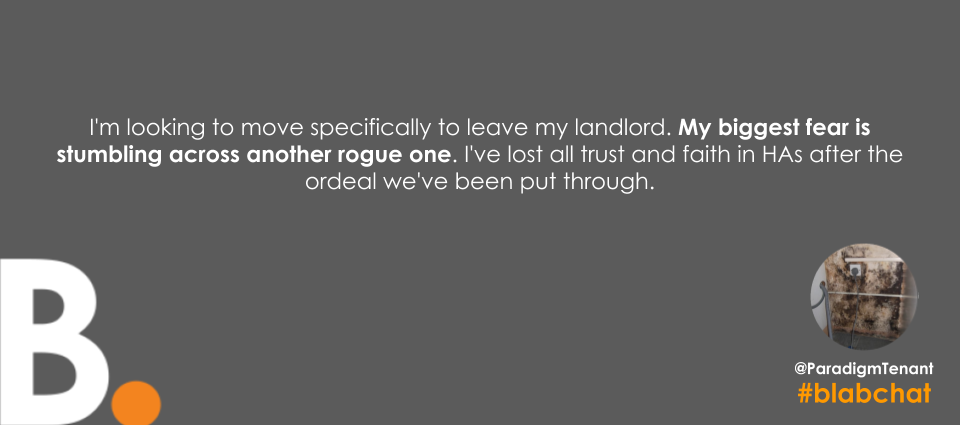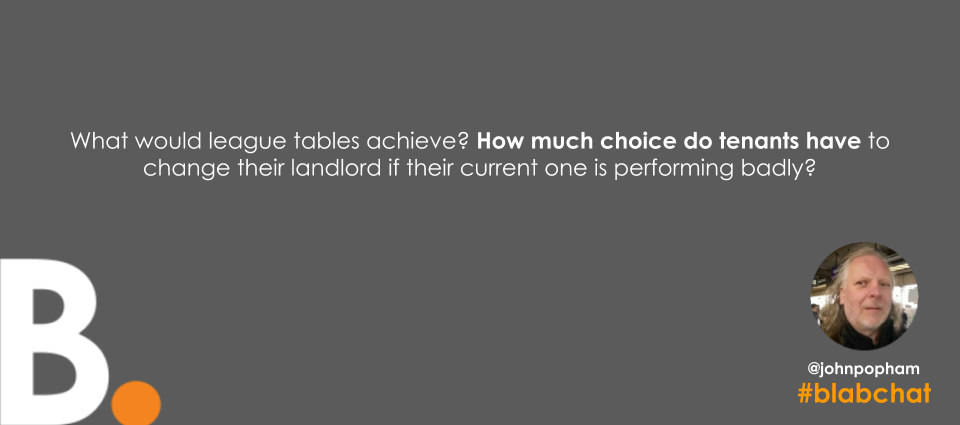“We need to be rebuilt around people, with a modern sense of trust and compassion, not just focused on efficiencies, league tables and being ‘high performing’. The basic principle of trust is easy: do what you say you are going to do. And ultimately the best way to build trust is to actually be trustworthy.”
-Paul Taylor, Do We Really Trust Brighthouse More Than We do Housing Associations?
The Social Housing Green Paper, published in response to the Grenfell tragedy, makes recommendations about the future regulation of housing associations - including the return of public league tables - ranking landlords from best to worst. Launching the Green Paper the Housing Secretary said the measures would “re-balance the relationship between tenants and landlords”. But would league tables really help us build trust and promote better accountability to tenants or would a TripAdvisor style alternative - ranked by tenants themselves - be a better option? Should we create something new?
In order to start unpicking these issues we’re hosting a workshop on 4th December on the topic of trust and accountability, so we wanted to use our December twitter chat to start a conversation and help inform our session. We made the decision to bring #blabchat forward a few days and this time, we ran it during a lunchtime and also livestreamed it for the first time ever; thank you for bearing with us and thank you to everyone who took part. We had some great comments from people joining from other HA’s as well as social housing customers. We’ve done our best to pull together a summary of the conversation, but there was so much great commentary, it’s impossible to include it all in the round-up. However, every comment was important to us, and we will be using every conversation to help shape up our thinking.
Overall, the conversation seemed to point towards three overarching factors which we will be keen to explore further during our workshop.
Being independent
Being transparent
Doing what we say
It seems that the general feeling is that openness leads to transparency, which leads to accountability, which ultimately, if followed though, leads to trust. In short, trust starts with open, honest communication.
Here’s our round-up of the conversation. We welcome your comments.
With ‘digital transformation’ programmes gathering pace across the sector, there is perhaps the danger that this can have a negative impact on face to face contact. @zamorasdream suggested that there is a ‘lack of face to face communication unless you're seen as a "problem"’. In turn, this can sometimes lead customers to feel that their voices aren’t heard. @Desmond_Curley spoke of landlords who fail to take customers concerns into account and the negative impact that can have on trust and @ChiDeltaWithNOR felt that landlords often act in their own self-interest, at the expense of their customers. @NeilTamplin suggested that this failure to recognise or relate to people’s needs is something that can affect trust across a range of sectors.
There was a general feeling that organisations that embrace openness and transparency are often trusted more than those that are guarded. @DanJHayes felt that clearly communicating with customers around such things as how rents are set and how money is spent within the organisation would help foster more trusting relationships.
Arguably, the real shift in power comes when landlords provide a meaningful mechanism in which customers can actively influence the services they receive, but @andyplant08 warned that any kind of ‘resident participation’ has to be more than a fig-leaf and needs to provide parity in decision-making which means sharing power is a must. This thinking was backed up by @zamorasdream who felt making decisions about services without consulting with customers can often be a causal factor in reduced trust.
For @Becky_Geoghegan, lack of trust in landlords could be improved if they just concentrated on getting the basics right. Misaligned expectations and a desire to do ‘the right thing’ can often lead to over promising and under delivering, which often doesn’t help.
@ChiDeltaWithNOR suggests that a failure of landlords to learn from long-term bad habits and mistakes and a sector wide apathy to challenge bad policy and practice are all factors that ultimately lead to lack of trust. @DavidJa05262630 echoed the thoughts of many contributors adding that when mistakes are clearly made there is a danger that landlords might switch into a ’self protection’ mode, rather than openly address the issues. This perhaps points to the import part different organisational cultures plays in determining the effectiveness of trust in relationships.
Failure to admit to ‘screw ups’ and a lack of honest and open communication were perhaps one of the overriding factors which people contributing to the conversation felt were important elements of trust building.
Ultimately, this all seems to boil down to customer experience. As @DanJHayes suggests, “in any relationship with a service provider (whatever service that is) - poor customer experiences reduce trust”.
@KillHousingBIll provided a great challenge to HA’s by suggesting that, “so many people working in social housing see ‘we’ as themselves and ‘they’ as tenants and leaseholders”. @KillHousingBIll went on to comment that in such cases it's harder to move forward to transparency, let alone accountability. The general viewpoint of many contributors was that being transparent was simple - HA’s simply need to get better at being open. By openly baring all, organisations open themselves to scrutiny and provide an opportunity for customers to hold them accountable.
Of course, for an organisation a reason to avoid working out loud is that you open yourself up to scrutiny. As @EmilydeCatalyst points out, many organisations may be “worried about making a mistake out loud!”. But this is essentially the key to accountability. To be truly accountable you need to leave yourself open. Emily went on to explain that often, a good response to a negative comment can be all the reassurance a customer needs. Accountability is therefore perhaps less about the issues itself, and more about the response.
@Real_Voices_ highlighted the importance of credible accountability. It’s important to be able to trust those mechanisms through which landlords are held to account. If customers believe that a regulator has failed to act upon something, the whole process can be called into question, “it begs the question why go to that effort”.
Whilst it’s hard to build cultures which seek out and openly embrace challenge, as @NeilTamplin suggests, it’s often well worth the investment, “organisations are not machines, they’re made up of people. It takes time to build cultures where people feel psychologically safe enough to work more openly and seek challenge.”
@shirleyayres suggested that transparency starts by “asking the people who use your services what they would like to know about your organisation.”
@Real_Voices_ offered a balanced view of league tables by reminding people that as with so many things there are both good and bad examples of them, “it depends on the accuracy, composition and the ability to scrutinise the raw data that goes into the tables, and being able to scrutinise how landlords collate it.” @DanJHaye reminded contributors that many HAs already submit KPIs to Housemark to compare their performance, but went on to remark that in his experience, “the KPIs that are seen as most important within organisations aren't necessarily directly focussed on the customer experience”. This felt like an important point. Surely, league tables or their alternatives have to have measures based around customer need, not the organisational need.
@johnpopham questioned the point of league tables at all, “what would league tables achieve? How much choice do tenants have to change their landlord if their current one is performing badly?” a point echoed by @EmilydeCatalyst who also warned that league tables can often drive the wrong behaviours. @NeilTamplin was able to reinforce this thinking by referencing the importance of exam results over outcomes in school league tables, “league tables are dependent on measures, and we have to be exceptionally careful what we choose to measure because that’s what gets managed, whether it results in better outcomes for people or not.”
@KillHousingBIll suggested an alternative could be “a national network of paid regional/local tenant panels, working alongside a regulator and reporting back to TRAs, MPs with recommendations for improvements which will be reviewed and acted upon” - again reiterating the importance of acting upon the concerns raised by customers.
An overriding concern seems to be that that league tables could introduce the wrong behaviours, with scores becoming more important than outcomes.
We were bowled over by the response to this edition of #blabchat. Here are a just few of the points which we feel summarise the direction of thinking:
I found this quote which seems to succinctly sum things up. I hope you would agree:
“The best way to find out if you can trust somebody is to trust them.”
-Ernest Hemingway
If you missed the live stream you can catch up on it here.
JOIN OUR WORKSHOP
On Tuesday 4th December we will be hosting a workshop at Bromford in Wolverhampton with special guests Neil Tamplin from Cadwyn HA and Phil Murphy of Real Voices to progress the conversations started during this tweetchat. Once again, we will be livestreaming and tweeting parts of workshop, so please keep an eye out for the #blabchat tag. If you would like to take part in the workshop please email us at lab@bromford.co.uk - we especially welcome tenants of social housing providers or people who work for them.
If we don’t see you at the workshop have a great Christmas and New Year! Thank you for all of you time and support during our 2018 twitter chats. Here’s to a new set of conversations in 2019!






















